G20 laments war in Ukraine but avoids blaming Russia
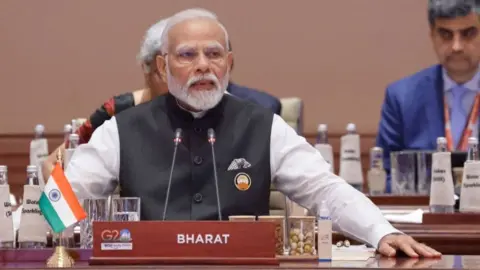 Getty Images
Getty ImagesThe G20 summit in India has agreed on a joint declaration, including a statement on the war in Ukraine.
On the first of their two-day meeting, G20 leaders denounced the use of force for territorial gain but stopped short of directly criticising Russia.
The Ukrainian government said the statement was "nothing to be proud of".
The summit in Delhi also discussed a number of global issues, including climate change and the debt burden of developing countries.
But it was a day of unexpectedly big headlines at the G20 summit.
Few expected a joint declaration, not least on the first day of the summit given the sharp divisions in the group over the war in Ukraine.
But Indian Prime Minister Narendra Modi announced that the group had reached consensus on the declaration.
A strong indication that last-minute negotiations were ongoing came in an earlier draft of the declaration accessed by the BBC on Friday - it showed the paragraph on Ukraine was left blank.
The sticking point was the Ukraine war - as it was during the Bali summit last year.
The Delhi declaration appears designed to allow both the West and Russia to find positives. But in the process, it has used language that is not as strong in its condemnation of Moscow as it was in Bali last year.
In Bali, the members deplored "in the strongest terms the aggression by the Russian Federation against Ukraine" - although it noted that "there were other views and different assessments of the situation and sanctions".
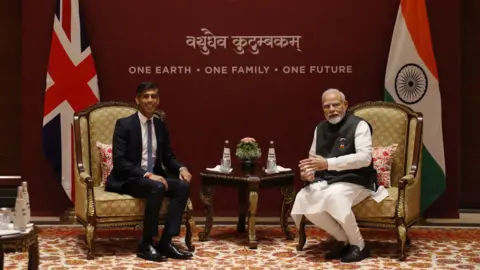 Getty Images
Getty ImagesThe Delhi declaration does not directly criticise Russia for the war.
But it does talk about "the human suffering and negative added impacts of the war in Ukraine with regard to global food and energy security". It also repeated the acknowledgement of "different views and assessments".
Importantly, the declaration specifies "the war in Ukraine" rather than "the war against Ukraine." This choice of words could have increased the likelihood of Russia endorsing of the declaration.
Ukraine - which took part in the Bali summit - was not invited this year, and its response to the declaration has been critical.
"In terms of Russia's aggression against Ukraine, G20 has nothing to be proud of," the Ukrainian foreign ministry tweeted.
It's hard for Kyiv to see the dropping of any reference to Russian "aggression" as anything but a sign that its Western backers are losing the argument with the "global South" over how to characterise the war.
The other big news came when Mr Modi formally invited the African Union (AU) to become a permanent member of the G20.
Delhi prioritised elevating the voices of these nations as the foundation of its presidency, and in the near future, it is poised to reap the rewards of this strategic choice as it vies with China for influence across Asia and Africa.
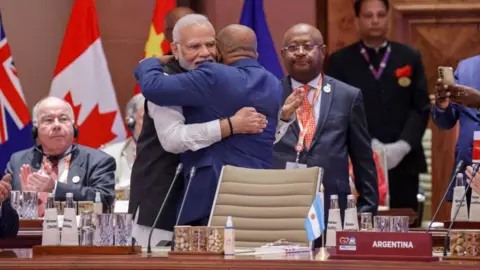 Getty Images
Getty ImagesThe decision is also good news for Africa as the continent of 1.4 billion people will now have wider representation on a global forum like the G20.
Climate change was another hotly discussed topic.
At the ministerial level meetings in the run-up to the summit, there had been no agreement on the issue. But now officials say they have reached "100% consensus".
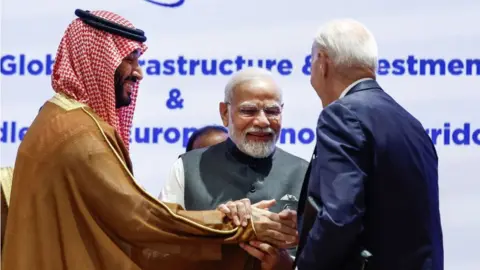 Getty Images
Getty ImagesThere has been evident give-and-take on climate in the declaration.
It says the G20 countries will "pursue and encourage efforts to triple renewable energy capacity globally through existing targets and policies". G20 accounts for more than 75% of greenhouse gas emissions.
Developing countries had in the past resisted increasing renewable energy targets, phasing down fossil fuels and reducing greenhouse gas emissions from developed nations.
On greenhouse emissions peaking - the point after which emissions will need to drop - developing nations have been able to buy time.
The declaration says that "timeframes for peaking may be shaped by sustainable development, poverty eradication needs, equity, and in line with different national circumstances".
Experts have also emphasised the importance of the Green Development Pact, a plan to tackle the environmental crisis through global co-operation over the next decade.
G20 countries have also pledged to work together to enable low-cost financing for developing countries to support their transitions to low emissions.
Pramit Pal Chaudhuri, South Asia practice head of Eurasia Group, said India had done "reasonably well" on green finance.
"Green finance now largely goes from rich countries to other rich countries. Private capital is central to this financing. Not even emerging economies get it. India has been pushing to change that. At the heart of it is to get multilateral development banks to begin the process of de-risking private capital flows in the green space," he said.
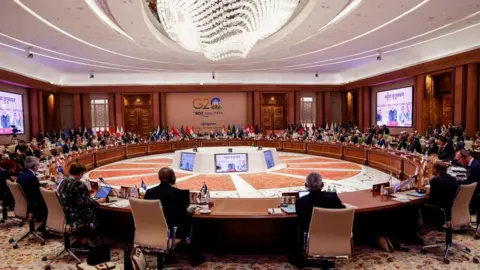 Getty Images
Getty ImagesThen there is the growing concern over debt. The World Bank has calculated that the world's poorest nations are burdened with an annual debt service of over $60bn to bilateral creditors, which escalates the risk of defaults. Two-thirds of this debt is owed to China.
The group has said it wants to help these countries manage their debt burden. The Delhi declaration has committed to address debt vulnerabilities in developing countries.
Additional reporting by Navin Singh Khadka in Delhi and BBC diplomatic correspondent Paul Adams in Kyiv.
